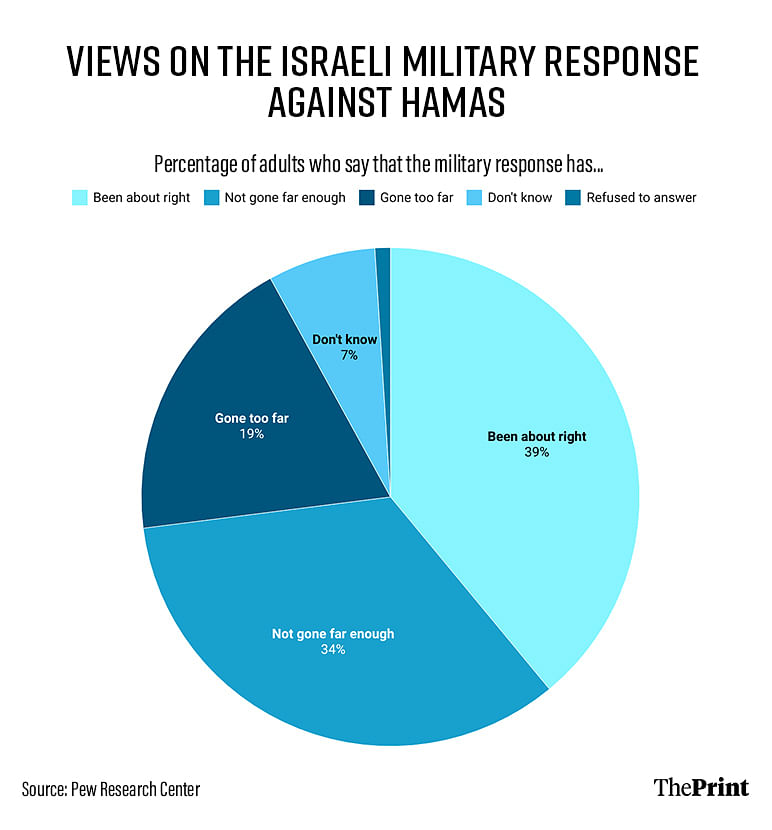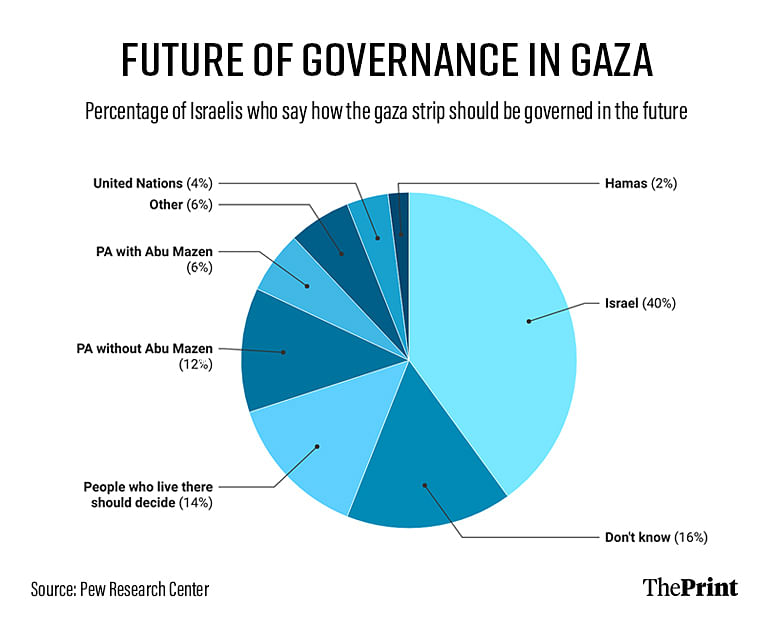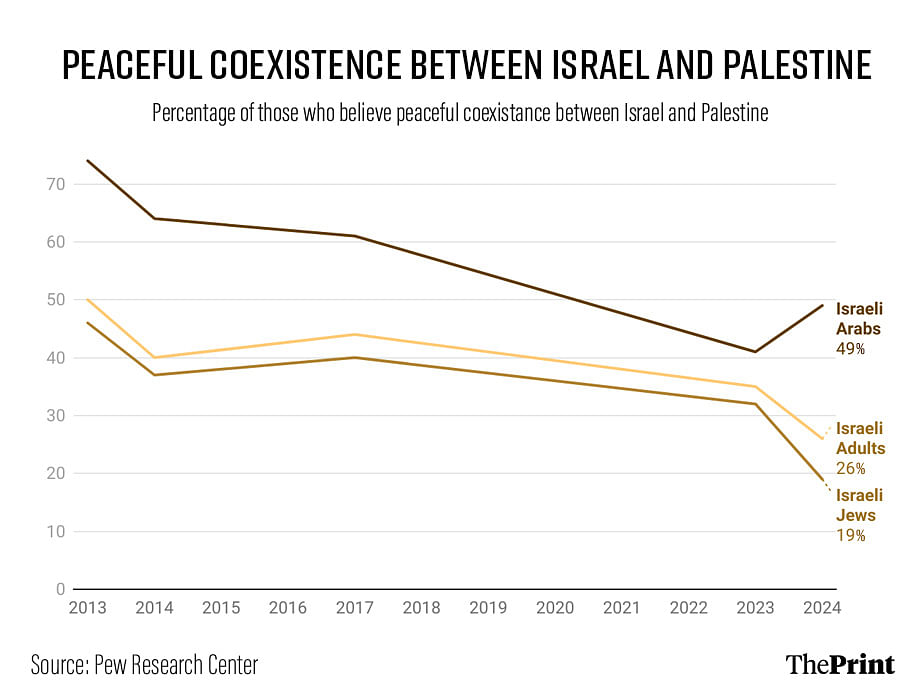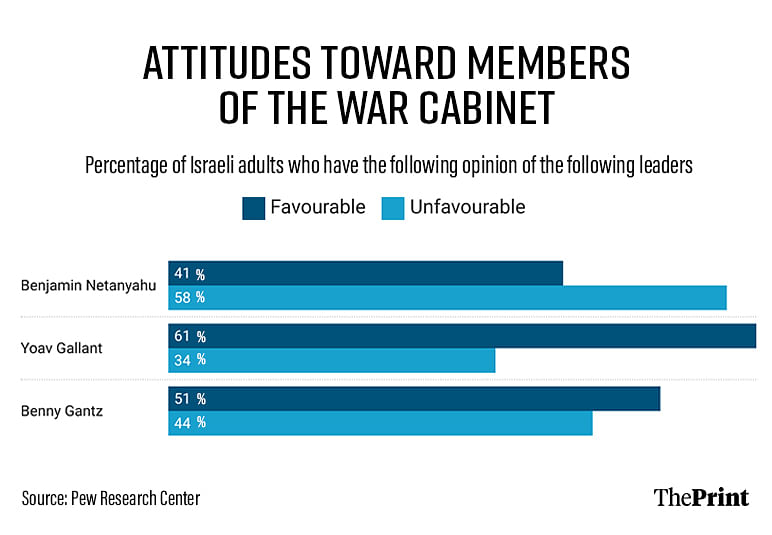New Delhi: The majority of Israelis believe that Tel Aviv’s military response to Hamas in Gaza has been about right or has not gone far enough, a new survey by Pew Research Center, published Thursday, has found.
The survey, which recorded responses from 1,001 Israelis and was conducted between 3 March and 4 April this year, also highlighted that support for the peaceful coexistence of a Palestinian and an Israeli state has fallen to 26 percent from 50 percent a decade ago.
Pew did not survey adults from East Jerusalem, West Bank or the Gaza Strip.
According to the survey, more number of Israelis (60 percent) disapprove of US President Joe Biden’s handling of the ongoing conflict between Israel and Hamas. Only 39 percent approve of his approach to the war.
On 7 October, 2023, Hamas — the militant outfit in control of Gaza since 2007 — launched an assault on Israel, killing about 1,200 Israelis and abducting 250 nationals. The Israeli military in response launched airstrikes and a ground invasion of Gaza. Israel’s retaliation has killed about 36,000 Palestinians, according to the Gazan health authorities.
About 39 percent of the Israelis surveyed believe that Tel Aviv’s military retaliation has been about right, while about 34 percent believe the operation has not gone far enough against Hamas. About 19 percent of the Israeli adults surveyed believe the military action has gone too far.

Support for Israel’s military action is, however, polarised between Jewish Israelis and Arab Israelis. About 74 percent of Arab Israelis believe that Tel Aviv’s military response has gone too far. Only 4 percent of Jews agree with this statement, the Pew survey found.
Support or criticism for Israel’s military response has also been split on ideological lines.
About 52 percent of those who identify themselves on the political Right believe the military action has been insufficient, while 24 percent of Israelis on the political Centre agree with this sentiment and only 9 percent from the Left believe the same.
In comparison, 55 percent of those on the Left believe that Tel Aviv’s retaliation has gone too far, a sentiment with which 15 percent in the Centre and 5 percent on the Right agree.
Also Read: Story of Israel-Iran friendship shows the latest conflict is neither inevitable nor permanent
Future of Israel and Palestine
Four in ten Israelis believe that Gaza should be governed by Tel Aviv after the end of the war. About 18 percent of Israeli adults believe that the Strip should be governed by the Palestinian Authority (PA), with or without Mahmoud Abbas (Abu Mazen) in charge.
About 14 percent of Israeli adults believe the people of Gaza should decide for themselves.

Belief in peaceful coexistence of Israel and Palestine has fallen by 24 percentage points in a decade, from 50 percent in 2013 to 26 percent in 2024. The sharpest decline is seen amongst Jewish Israelis, from 46 percent who believed peaceful coexistence was possible in 2013 to 19 percent in 2024. Five in ten Israelis believe that peaceful coexistence between an independent Palestine and Israel is not possible.
Among Arab Israelis, however, the belief in peaceful coexistence of the two states has increased to 49 percent in 2024 from 41 percent in 2023. In 2013, 74 percent of Arab Israelis held this view.

Of those who believe that the two states can coexist peacefully, the majority (56 percent) envision an independent Palestinian state containing both Gaza and the West Bank.
Ratings of politicians
The survey also looked at popular support for three members of the Israeli war cabinet – Prime Minister Benjamin Netanyahu, Defence Minister Yoav Gallant and National Unity Party leader Benny Gantz.
Nearly six in ten (58 percent) Israelis have an unfavourable view of Netanyahu. Gallant, in comparison, is the most popular of the three, with 61 percent of Israelis favouring him, while the centrist Gantz has a favourability rating of 51 percent.

Netanyahu’s favourability among the Israeli public is the lowest since Pew first started asking this question in 2013. It has fallen from 56 percent in 2013 to 41 percent currently.
The survey also found that support for the three war cabinet members is split among the Arabs and the Jews in Israel. While 74 percent of Jews have a favourable opinion of Gallant, only 9 percent of Arabs say the same. It should be noted that Gallant during the current conflict called for the “complete siege” of Gaza, including cutting off access to food, water and electricity to the besieged people.
Only 7 percent of Arabs have a favourable opinion of Netanyahu, while 51 percent of Jews have the same. Gantz is the only politician to have a lesser divide in support from both Arab Israelis and Jewish Israelis — 30 percent to 56 percent, respectively.
The Pew survey found that support for Biden has also fallen in Israel to 57 percent in 2024 from 68 percent a year earlier. The staunchest supporters of Biden in Israel are those from the ideological right (61 percent). Those on the left (48 percent) are far less confident in his handling of global affairs.
(Edited by Nida Fatima Siddiqui)
Also Read: Hostage families see no benefit of military operation in Gaza. They are let down by Netanyahu






